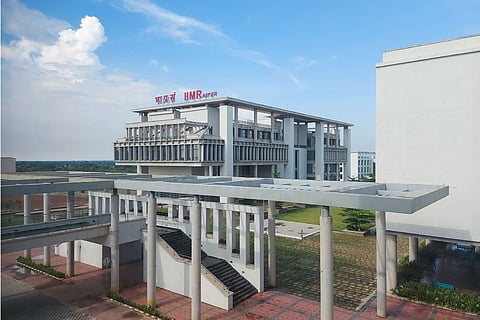

In a significant shift within India’s premier management education ecosystem, the Indian Institute of Management (IIM) Raipur has announced its decision to exit the Common Admission Process (CAP) for the 2025 MBA cycle.
CAP, a process followed by several IIMs for admissions, has been a staple in the institute’s selection framework for years.
By stepping away, IIM Raipur seeks to create a more tailored admissions process designed to attract diverse talent and align with its commitment to fostering business leaders from across the country.
Responding to reports suggesting that the decision was driven by concerns over the “inferior quality” of candidates, Director Prof Ram Kumar Kakani firmly clarified that such an assertion is unfounded.
“I disagree with that particular notion. I’m sorry to say, inferior is definitely not the right word. The word ‘inferior’ has never been used,” he stated during an exclusive interview with EdexLive.
He emphasised that the move reflects a proactive approach to capacity building and inclusivity, rather than any critique of previous admissions processes. Describing the vision behind these changes, Prof Kakani explained that the institute’s motto, “Building Business Owners,” serves as the guiding principle for the new admissions framework.
The director noted the importance of a gradual and deliberate approach, stating that the focus is on fostering an entrepreneurial mindset through carefully planned adjustments, or “product tweaks,” that align with the institute’s long-term goals.
The decision to step away from CAP, as explained by Prof Kakani, has been years in the making. As a centralised process followed by several IIMs, CAP offers uniformity but limits the ability of individual institutes to adapt admissions to their specific goals.
“The Academic Council of IIM Raipur began discussing this in July 2022, and we formally informed the governing bodies in mid-2023,” Prof Kakani shared, describing the methodical planning behind the shift.
The move aligns with IIM Raipur’s long-term goals, including ambitious campus expansion plans and international collaborations.
“By 2027, we plan to double our campus capacity and introduce dual-degree programmes, including partnerships with international universities,” he revealed.
The institute is in talks with varsities such as the University of Wolverhampton, England, to launch programmes where students will spend one year in India and another abroad, fostering global exposure and industry relevance.
Under the new system, IIM Raipur’s admissions process begins with the Aggregate Index Score (AIS), a weighted formula used to shortlist candidates for the Group Discussion (GD) and Personal Interview (PI) stages. The AIS includes the following components:
CAT Scores (50%): Candidates’ performance in the Common Admission Test (CAT) remains the most significant factor.
Academic Performance (40%): Split equally between Class X (20%) and Class XII (20%) scores.
Diversity Scores (10%):
Gender Diversity: Female and transgender candidates receive an additional 7% weight.
Academic Diversity: Eligible candidates are awarded 3% weight.
Candidates shortlisted through the AIS then proceed to the GD and PI stages, to be conducted in New Delhi, Mumbai, Bengaluru, Hyderabad, Kolkata, Lucknow, Guwahati, and Raipur, after which the Final Merit List is compiled. The components for the Final Merit List include:
CAT Scores (50%): This remains a crucial criterion.
Personal Interview (25%): Evaluates the candidate’s interpersonal and problem-solving skills.
Work Experience (15%): Rewards practical exposure and industry knowledge.
Group Discussion (5%): Assesses oral communication and teamwork skills.
Profile Score (5%): Considers factors like academic diversity and institutional quality.
The inclusion of group discussions (GDs) sets IIM Raipur apart from many IIMs that have replaced this component with written ability tests (WATs) or extempore tasks. GDs are designed to assess oral communication skills and teamwork, while written communication is evaluated through a preparatory exercise where candidates note their thoughts before the discussion.
Prof Kakani added that the institute has also integrated an Enterprise Resource Planning (ERP) system into its admissions portal, aimed at improving transparency and streamlining admissions-related processes.
“In case anyone wants feedback, we’re also working on a system where they can click a button to request it,” he clarified.
More details about the admissions process can be found here.
The admissions panel will feature two faculty members alongside an industry expert with at least 10 years of professional experience.
“This system is based on studying admissions at IIM Kozhikode, IIM Ahmedabad, and other institutions,” Prof Kakani explained, emphasising that the approach draws on the best practices from leading B-schools.
The inclusion of an industry expert is particularly significant, as it introduces a real-world perspective into candidate evaluations. Faculty members bring academic rigour and a deep understanding of institutional goals, while the industry expert assesses candidates for traits such as leadership potential, adaptability, and problem-solving skills — qualities critical for excelling in today’s business environment.
IIM Raipur’s commitment to gender diversity continues to be a defining feature of its admissions strategy. In the 2022-2024 batch, 62% of accepted students were female.
“Our offers were a 50-50 split between male and female. The acceptances were 62% female and 38% male. Girls prioritise IIM Raipur over other institutes because of certain inbuilt advantages,” Prof Kakani stated.
He highlighted these advantages, noting: “We have a gynaecologist visiting our campus every week, which is very unique for a campus of this size and shape. All our hostels are radiant-cooled and have attached toilets and bathrooms, which is not common in most places. Additionally, Raipur is centrally located and just 20 minutes from the airport, which makes parents feel far more secure in sending their children here.”
As IIM Raipur gears up to implement this bold new admissions process, Prof Kakani urges aspirants to embrace the change with an open mind.
“Change is something which is permanent. Whenever there is change, there is a lot of thought, a lot of worry out there. I would request potential applicants to just be calm and cool and enjoy the process. Trust me, they will definitely benefit from it.”
